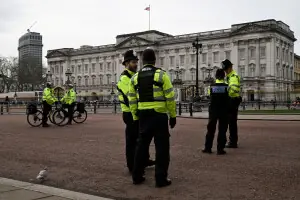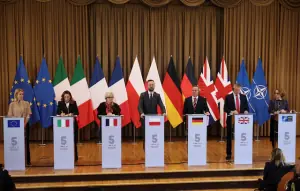Afghan Taliban carry out first public execution since takeover
3 min readKABUL: An Afghan man convicted of murder was executed in public Wednesday, the Taliban said, the first confirmation of such a sentence since the Taliban returned to power.
Last month, Taliban supreme leader Hibatullah Akhundzada ordered judges to fully enforce aspects of Islamic law that include public executions, stonings and floggings, and the amputation of limbs from thieves.
They have carried out several public floggings since then, but Wednesday’s execution in Farah – capital of the western province of the same name – is the first the Taliban have acknowledged.
“The supreme court was instructed to implement this order of qisas in a public gathering of compatriots,” Taliban spokesman Zabihullah Mujahid said in a statement, referring to the “eye for an eye” justice in Islamic law.
In a later tweet, Mujahid said the victim’s father had carried out the sentence, shooting the condemned man three times with a Kalashnikov.
The statement named the executed man as Tajmir, son of Ghulam Sarwar, and said he was a resident of Anjil district in Herat province.
It said Tajmir had murdered a man, and stolen his motorcycle and cell phone.
“Later, this person was recognised by the heirs of the deceased,” it said, adding he had admitted his guilt.
UN Secretary-General Antonio Guterres voiced “deep concern” about the public execution, spokeswoman Stephanie Tremblay said.
“Our position has never changed. The United Nations is against the death penalty… So we call for a return to the moratorium on the death penalty” in Afghanistan, she said.
Severe restrictions
The Taliban regularly carried out punishments in public during their first rule that ended in late 2001, including floggings and executions at the national stadium in Kabul, which Afghans were encouraged to attend.
“I remember when they were implementing these punishments in their first stint, where they would announce for the public to gather,” rights activist Ogai Amil told AFP.
She said Wednesday’s execution reminded her of those days, adding it “shakes the human conscience”.
“Why should it happen only in Afghanistan?” she asked.
The hardline Islamists had promised a softer rule this time round, but have introduced increasingly severe restrictions on the lives of Afghans.
Women in particular have been incrementally squeezed out of public life since the Taliban’s return.
Those in government roles have lost their jobs – or are being paid a pittance to stay at home – while women are also barred from travelling without a male relative, and must cover up with a burqa or hijab when out of the home.
Schools for teenage girls have also been shuttered across most of the country for over a year.
Mujahid said the case for Wednesday’s execution had been thoroughly examined by a series of courts before the supreme leader gave the order.
“This matter was examined very precisely,” he said in the statement. “In the end, they gave an order to apply the Shariah law of retribution to the murderer.”
Akhundzada, who has not been filmed or photographed in public since the Taliban returned to power in August 2021, rules by decree from Kandahar, the movement’s birthplace and spiritual heartland.
The statement included the names of dozens of court officials as well as other Taliban representatives as being present for the execution.
For the latest news, follow us on Twitter @Aaj_Urdu. We are also on Facebook, Instagram and YouTube.























Comments are closed on this story.